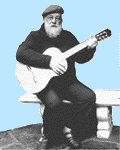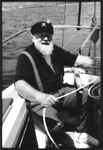
 Born in Hunt, Illinois, Ives sang folk songs from an early age, many of which he learned from his pipe-smoking, tobacco-chewing grandmother. In 1930, Ives dropped out of college and hitchhiked across the country learning folk songs from miners, cowboys, hoboes, and evangelists.
It's hard to say which song or performance is the most memorable in the career of Burl Ives. Broadway boasts of his role in the 1950s as Big Daddy in Cat on a Hot Tin Roof. Millions remember Ives from the 1962 television special, Rudolph the Red-Nosed Reindeer, which still runs every Christmas season. Children sang along with his records on such classic tunes as, Holly Jolly Christmas, and Little White Duck. On the big screen, Burl's performance in The Big Country, won him an Academy Award for best supporting actor.
Burl Ives died of cancer on April 14, 1995. He was 85. Following is an interview with his widow, Dorothy Ives, from her home in Washington state.
Born in Hunt, Illinois, Ives sang folk songs from an early age, many of which he learned from his pipe-smoking, tobacco-chewing grandmother. In 1930, Ives dropped out of college and hitchhiked across the country learning folk songs from miners, cowboys, hoboes, and evangelists.
It's hard to say which song or performance is the most memorable in the career of Burl Ives. Broadway boasts of his role in the 1950s as Big Daddy in Cat on a Hot Tin Roof. Millions remember Ives from the 1962 television special, Rudolph the Red-Nosed Reindeer, which still runs every Christmas season. Children sang along with his records on such classic tunes as, Holly Jolly Christmas, and Little White Duck. On the big screen, Burl's performance in The Big Country, won him an Academy Award for best supporting actor.
Burl Ives died of cancer on April 14, 1995. He was 85. Following is an interview with his widow, Dorothy Ives, from her home in Washington state.
GT: How would Burl Ives have wanted to be remembered?
DI: He was mainly interested in touching hearts. He would never allow us to sell a record at any of his concerts. He would never be a shill for himself. He was interested in getting out there and touching the heart of the audience. I think he would like to be remembered as a good man.
DI: He loved sailing. He also loved reading. I read to Burl every morning and continuously on airplanes and backstage and in hotel rooms and around the world. We did a 27-year study on world cultures, world religions, stuff like that.
GT: What would the public be surprised to learn about him?
DI: They would be surprised to know how very shy he was. And, how extremely well read he was. He was self-educated. If there was a subject that interested him he read about it. When he lived in Ireland, he studied everything about Ireland. He loved to read the Encyclopedia and his nighttime reading was Yachting magazine for years.
GT: Do you have any favorite stories about Burl?
DI: Well, he certainly wasn't a cook. We were living in New Mexico and I wasn't feeling well one day, and Burl decided to cook for me. I tell you, the smell of it-if I was sick to my stomach before... So he said "If you don't want it, I'll give it to El Gato, our manx cat. He was a huge cat, 20 or 30 pounds. And he would come to the kitchen door and we'd put food down. I got up, and walked in to see Burl do this. And El Gato-this is absolutely the truth-he smelled it, his hair raised up, and he backed out the door and we never saw him again. That's one story we laughed a lot about.
GT: What do you think is the strongest impression people have of Burl?
DI: Now, since he's been gone, I have received two baskets full of condolences and sympathy and stories. Everybody has something that they related to about him. But all of it was about his integrity, his gentleness. So many people called him a "Gentle Giant."  GT: What activities brought him the greatest enjoyment?
GT: What activities brought him the greatest enjoyment?
 There was a quality that Burl brought with him for us all to absorb, in a sense, and that was pure simplicity. Burl was a quiet man. And the simplicity was very sophisticated.
There was a quality that Burl brought with him for us all to absorb, in a sense, and that was pure simplicity. Burl was a quiet man. And the simplicity was very sophisticated.
 Eddie Albert spoke at two of the memorials. They were very dear friends, since 1937. He told us a story: Burl and Eddie were living together in Hollywood. Eddie had a job and Burl had a job at a radio station. Burl came home one day and said, "Eddie, there's a family living in a box car and they just came from the dust bowl (this was in the late 30s). The man plays a mean guitar." Eddie said, "Well, we have a big place here, (neither of them were married at that time). Why don't you just invite them to stay here."
Eddie Albert spoke at two of the memorials. They were very dear friends, since 1937. He told us a story: Burl and Eddie were living together in Hollywood. Eddie had a job and Burl had a job at a radio station. Burl came home one day and said, "Eddie, there's a family living in a box car and they just came from the dust bowl (this was in the late 30s). The man plays a mean guitar." Eddie said, "Well, we have a big place here, (neither of them were married at that time). Why don't you just invite them to stay here."
 When Eddie came home from work he could hear the guitar playing and he came into the kitchen and there were big pitchers of milk and a mess of chicken, and the two little children were running around. And this man came up and said, "Hello Mr. Albert, thank you for having us. My name is Woodie Guthrie."
When Eddie came home from work he could hear the guitar playing and he came into the kitchen and there were big pitchers of milk and a mess of chicken, and the two little children were running around. And this man came up and said, "Hello Mr. Albert, thank you for having us. My name is Woodie Guthrie."
 I never knew this, until I met Eddie Albert. Burl never told me about it. If he did something, he never spoke about it. He never blew his own horn. He didn't like to do talk shows, he said, "That's the bicycle pump treatment."
I never knew this, until I met Eddie Albert. Burl never told me about it. If he did something, he never spoke about it. He never blew his own horn. He didn't like to do talk shows, he said, "That's the bicycle pump treatment."
 He truly had great integrity. Great tenacity of purpose. He was lazy in a lot of ways, but not when it came to his art. He practiced for many, many years.
He truly had great integrity. Great tenacity of purpose. He was lazy in a lot of ways, but not when it came to his art. He practiced for many, many years.
 Burl had a vocal exercise he would do every morning, no matter where he was, what hotel, he was constantly doing T,T,T. Our grandchildren used to hear him and they would imitate Poppa. I said to him one day, "Burl, what are you doing?" And he said, "I'm searching for the perfect vowel."
Burl had a vocal exercise he would do every morning, no matter where he was, what hotel, he was constantly doing T,T,T. Our grandchildren used to hear him and they would imitate Poppa. I said to him one day, "Burl, what are you doing?" And he said, "I'm searching for the perfect vowel."
 In August of 1989, he stopped doing it. I said, "Burl, what happened? I thought you were searching for the perfect vowel?" He just gave me that sort of smile, and looked at me with a twinkle, and said, "What makes you think I haven't found it?"
In August of 1989, he stopped doing it. I said, "Burl, what happened? I thought you were searching for the perfect vowel?" He just gave me that sort of smile, and looked at me with a twinkle, and said, "What makes you think I haven't found it?"
 I'm going to miss him just like the world will, but I think I'm going to miss him a little more.
I'm going to miss him just like the world will, but I think I'm going to miss him a little more.


